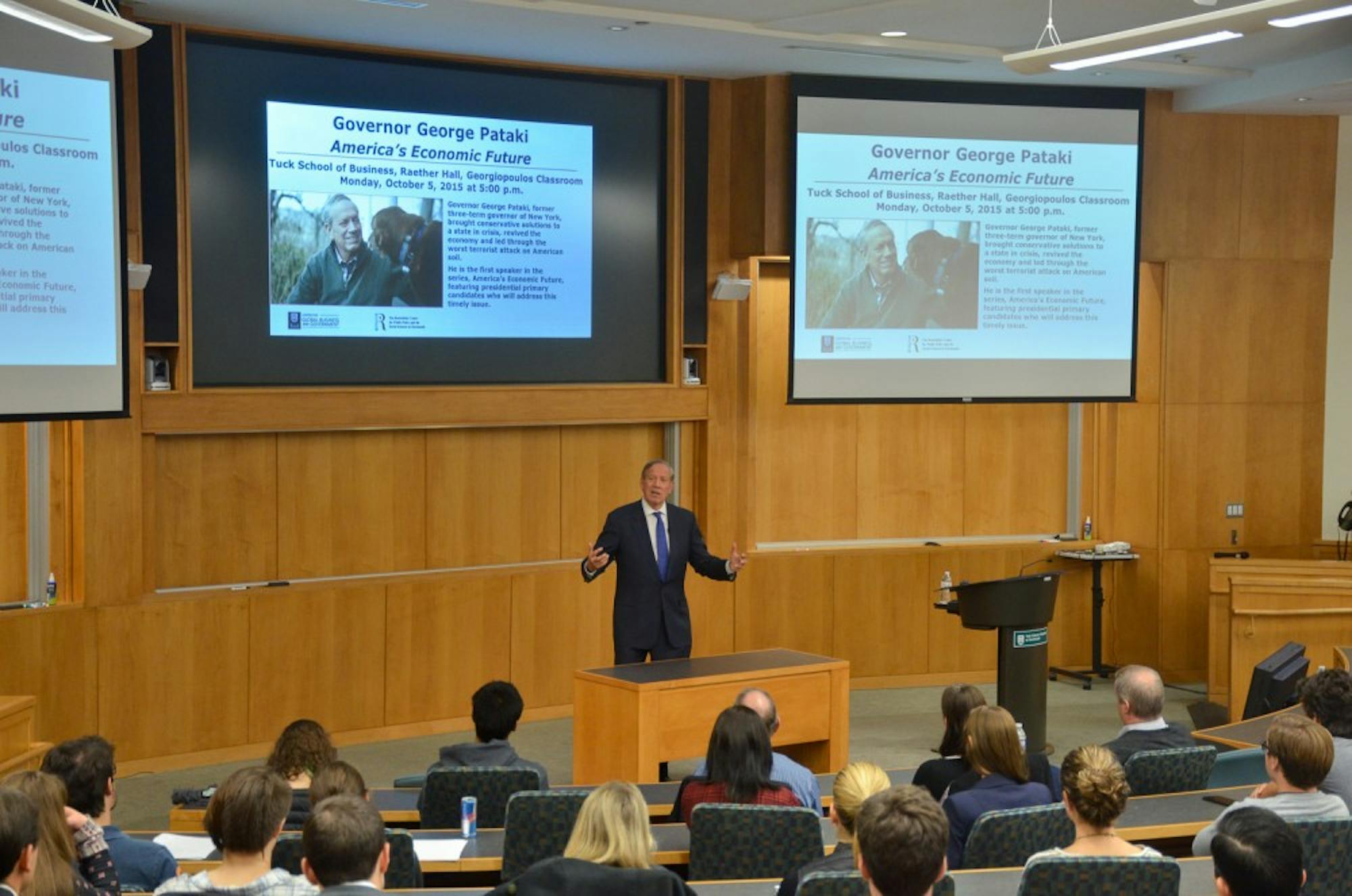Five months after formally announcing his bid for the Republican presidential nomination in Exeter, New Hampshire, former New York governor George Pataki returned to the Granite State on Monday night and spoke to a small crowd of students, faculty and Upper Valley community members in the Georgiopoulos Classroom at the Tuck School of Business.
Co-sponsored by the Tuck Center for Global Business and Government and the Rockefeller Center for Public Policy, Pataki’s lecture was the first in a series which will feature presidential candidates addressing the topic of America’s economic future.
Pataki’s lecture touched on topics ranging from America’s corporate regulatory system to global climate change. He proposed smaller government, fewer tax codes and increased political bipartisanship as key components to economic success.
Former New Hampshire Governor John Lynch (D), a senior fellow at the Center for Global Business and Government and the event’s organizer, said that a number of campaigns have been invited to speak as part of the series. He emphasized that Dartmouth students have a unique opportunity to hear directly from candidates because of New Hampshire’s first-in-the-nation primary status.
“In most other states, campaigns are conducted through the media,” he said. “But here, candidates really do engage in retail politics where they’re able to talk directly with voters.“
Pataki’s campaign website and brochures tout the slogan “People over politics,” a motto that was repeated throughout his 20-minute lecture.
“Washington has become a planet apart — an insider’s game,” Pataki said, pointing to political corruption among Washington elites as a major source of economic turmoil.
If elected president, Pataki stated that he would ban all elected federal officials from registering as lobbyists at the end of their political careers. Pataki also proposed lowering corporate tax rates, decreasing the “regulatory burden” on corporations and lowering the “size, power and cost” of federal government to better the economic climate.
In response to an audience member’s question about government funding of scientific endeavors, Pataki said that more “pure research” in universities, nonprofit organizations and the private sector should be funded to allow private companies to advance technology.
Pataki remarked that the Republican party as a whole must “embrace science” by accepting vaccine science, the theory of evolution and global climate change. He expressed support for fracking and construction of the Keystone XL pipeline as “21st-century solutions” to America’s energy crisis.
When asked about decreasing the cost of higher education, Pataki said that he was “open to suggestions” on the matter, but offered reducing regulations on colleges and universities and decreasing the size of academic administrations as solutions.
Pataki also cited a program designed under his administration as governor that rewarded students for entering science, technology, engineering and mathematics — commonly referred to as STEM — fields by forgiving tuition costs and student loan debt as a tool to lower the cost of attending college.
On the subject of global refugees, Pataki stated that families fleeing harmful situations are “deserving of the compassion of the West,” but that the United States has “no obligation” to economic refugees looking to “get around immigration laws.”
He also expressed concern that terrorist organizations such as the Islamic State — also known as ISIS or ISIL — are using refugee crises to get “radicalized people” into the West.
Adil Ahsan ’19, a student in the audience, said that he attended the event to learn more about Republican candidates, having followed primarily Democratic candidates in the news. Ahsan said that Pataki was more “nuanced in his approach” than some of the more visible candidates like businessman Donald Trump.
“I agree with his trying to cut down the government, because bureaucracy can sometimes act for it’s own sake and not for the people,” Ahsan said. “But I don’t agree with his policy on taxes and on global intervention. The vibe I got was that he’s very interventionist.”
Another audience member, Henrique Bahr Tu’16, said he thinks that Pataki’s campaign differs from that of other Republican candidates in terms of policy and ideology.
“It was an interesting speech, given that he’s a conservative but he was touching on subjects like science — things that Republicans are, to some extent, stubborn about.” Bahr said. “He was more [politically] centered and more bipartisan.”
Prior to the public lecture, Pataki also met with students in the Rockefeller Center for an informal meet-and-greet.
Pataki was elected governor of New York in 1994 and served three consecutive terms before leaving office in 2006 to practice law in New York City. He announced his presidential candidacy in May 2015. The 2016 presidential election marks his first national campaign.




